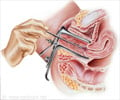- Apgar BS, Kaufman AH, George – Nwogu U, Kittendorf A. Treatment of Menorrhagia. American Family Physician 2007; 75 (12): 1813-19.
- Joanne Protheroe. Modern management of menorrhagia. Journal of Family Planning and Reproductive Health Care 2004; 30(2): 118–122
- Ely JW, Kennedy CM, Clark EC, Bowdler NC. Abnormal Uterine Bleeding: A Management Algorithm. JABFM 2006;19 (6): 590 - 602
About
Menorrhagia is a condition where a woman has menstrual periods that are heavy (with a blood loss of more than 80 ml per cycle) or prolonged (lasting for more than seven days per cycle). The cycles however are regular and the woman does not experience bleeding between periods.
Menorrhagia can affect women at any age. Adolescents may experience menorrhagia or irregular periods during the first 1 to 2 years of menstruation. This occurs because the hormonal system that controls menstruation is not fully developed initially. The first few cycles are often anovulatory i.e. the egg is not released from the ovary. Anovulatory cycles lead to further hormonal disturbances that result in excessive bleeding. If the abnormal bleeding continues beyond the first 2 years, the patient may need to be checked for a bleeding or clotting disorder.

The cause of menorrhagia is diagnosed through blood tests and procedures such as sonography, hysteroscopy, biopsy and dilatation and curettage. Cancer of the uterus should be ruled out in older patients.
A patient of menorrhagia is treated with drugs such as Non Steroidal Anti Inflammatory Drugs (NSAIDs) e.g. naproxen and diclofenac. Other drugs used are those that prevent breakdown of clots e.g. tranexamic acid and hormones. Patients not responding to drugs and those who have completed their family can opt for surgical treatment.
Excessive menstrual bleeding may lead to complications such as anemia. The patient’s quality of life also gets affected. Her work schedule as well as her sexual life could be disturbed due to menorrhagia.
















